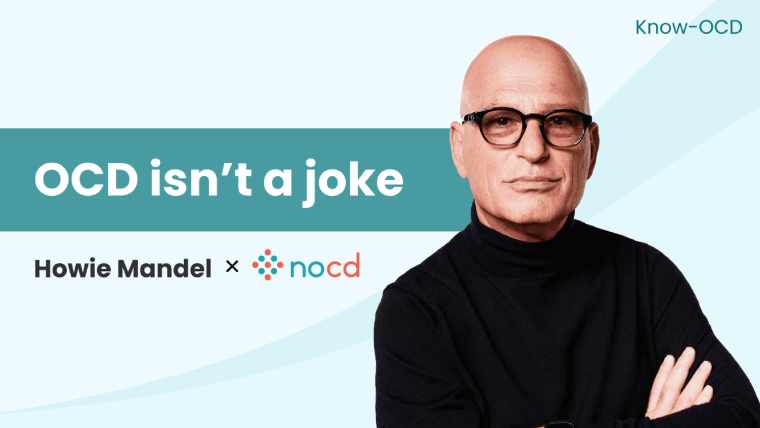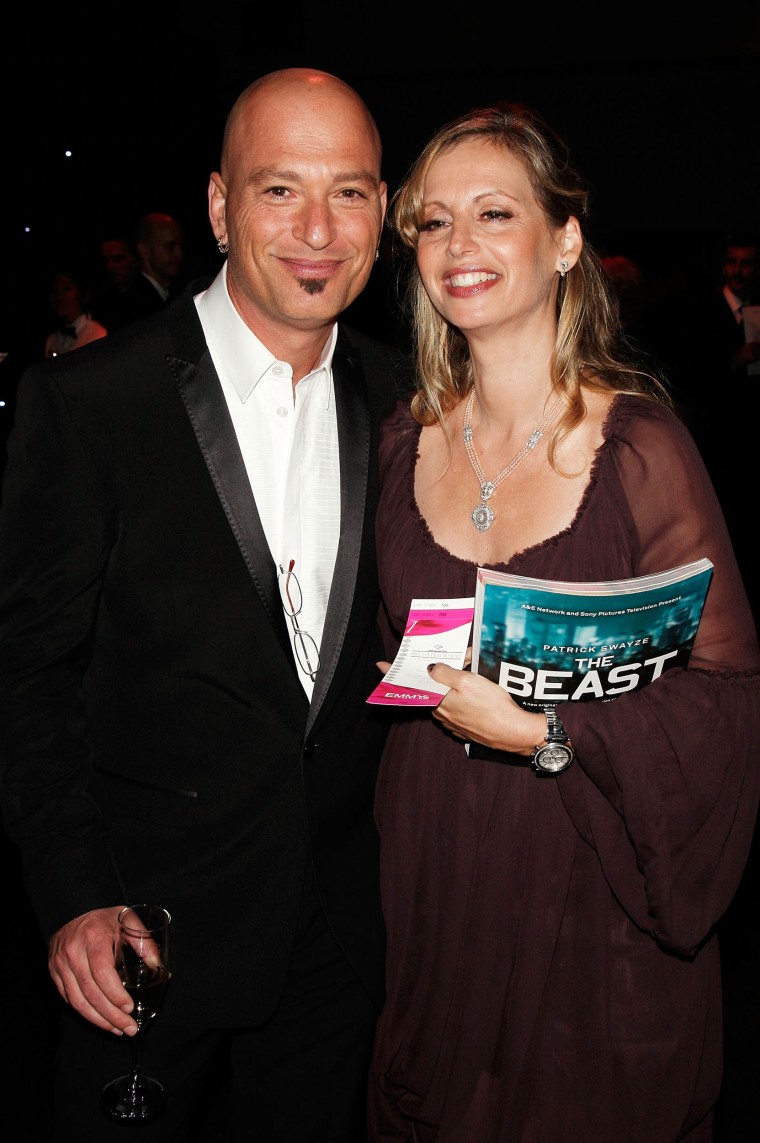Howie Mandel appreciates a good laugh as much as the next comedian, but he's tired of people joking about OCD.
“I can’t tell you how many people come up to me and go, ‘Oh, yeah, I’m a little OCD, too. I like everything in order. If my room is not clean, I’m just not happy. I've got a little OCD,'" he tells TODAY.com. "You can’t have a little OCD."
Over the last couple of decades, Mandel's standup comedy and work on hit shows like "Deal or No Deal" and "America's Got Talent" have made him a household name. But he's also well-known for preferring fist bumps to handshakes, something he attributes to his OCD (obsessive compulsive disorder).
The 67-year-old is the first to admit that he uses laughter as a "panacea," but he's also remarkably honest about the struggles he's experienced as a result of OCD.
"I’ve been really successful. I have a beautiful family, and I love what I do. But inside my head, it is a war zone, and it’s a war worth fighting, and I continue to fight it,” he says.

These days, Mandel is working with NOCD, an organization that offers affordable and accessible online therapy along with resources and treatment options for OCD. He calls the NOCD app a "lifesaver in your pocket" and encourages anyone who thinks they might have OCD to take advantage of the organization's resources.
As a NOCD partner, Mandel wants to get people more comfortable talking about OCD, as he was once hesitant to discuss it himself.
“I wouldn’t go see a therapist. I wouldn’t go see a psychiatrist. I would not talk about the word 'mental health' at all,” he says.
Howie Mandel's OCD diagnosis
Mandel was diagnosed with OCD in his late 40s. But even before that, the condition hindered his home life.
“I’d have my children and my wife spray everything down and not touch things. I wouldn’t take things that they were handed. I would remove some of their toys that I saw touch the ground. I was making their life miserable,” he recalls.
Eventually, Mandel's wife, Terry, convinced him to get help.

“My wife just gave me an ultimatum. She goes, ‘I can’t do this anymore and I can’t have the children do it anymore. And if you don’t get help, that’s it,’” Mandel says. “So it was an ultimatum that made me ultimately go to therapy, and I got diagnosed (with OCD).”
Getting a proper diagnosis was “comforting” for the comedian, especially when he began seeking treatment for his OCD, but he still wasn't quite ready to embrace his diagnosis.
“I was embarrassed that I had this problem, and when you have a mental health problem, there is a stigma,” he explains.
Still, Mandel acknowledges that he was lucky to get a proper diagnosis since the majority of people with OCD are misdiagnosed at first.
"Even if you go to a therapist or psychiatrist, they may not be an (OCD) expert specifically," he says.
Living with OCD: Treatment and triggers
Once he received a diagnosis, Mandel began to understand that there were multiple ways to get a handle on his OCD. However, he quickly learned that there’s no one-size-fits-all treatment plan.
With options like medication, exposure and response prevention (ERP) therapy, and talk therapy, finding what works can seem daunting at first. For Mandel, a mix of medication, therapy and a busy schedule have helped, but he’s quick to note that OCD requires constant maintenance.
People tend to downplay how serious OCD is, but the star says the “intrusive thoughts” the condition brings can be completely debilitating and says his life was a "horror show" at one point.
“The inability to control your brain with these obsessive thoughts and the compulsion to fight them is far more prevalent in somebody with OCD. (Other) people have weird thoughts that go through their head and then it goes away,” he says.
People with OCD, including Mandel, have their own unique triggers and rituals they’ve developed to cope with them.
“I still don’t shake hands because of my fear of a trigger. Ninety-nine percent of the time, I know that I could shake your hand and nothing is going to happen. I just don’t want to be triggered, so that’s why I don’t shake hands,” he says.
OCD triggers can be unpredictable, so Mandel relies on a mix of resources to keep his in check when they do materialize.
“I’m always ready and if something does happen, I have some tools and professionals around me and family members and friends that are incredibly supportive that’ll get me through it,” he says.
One of those supporters is Mandel's wife, who he describes as "a saint."
"The hardest thing is having OCD. The second hardest thing is being with somebody who has OCD if they legitimately have OCD and they’re not just persnickety. And it was always tough on our relationship," he says.
The couple has been married 43 years and has three kids and two grandchildren.
"(Terry) has been nothing but supportive. It’s important to have people around you who are there for you. That's key, but they don't know to be there for you if you don't talk about it," he says.
Mandel's mission: Talking candidly about OCD
When he was first diagnosed with OCD, Mandel wasn't ready to talk about it publicly. Now, he's determined to use his platform to help shatter the stigma.
"They say that misery loves company. I don’t know that I’m thrilled that one out of 40 people have OCD, but it makes my mission even more prevalent,” he says. “I know how painful it is. I don’t want people to go through what I go through, and a lot of people go ... through worse.”
While Mandel is happy to see that the stigma associated with mental health challenges is easing, he emphasizes there's still a long way to go.
"The more people that are open about it, the more people that talk about it, the wider that safety net gets thrown for all of us," he says.
These days, Mandel talks about his OCD without hesitation and hopes others follow suit.
"When one is suffering, when one is drowning, you need to say 'Help!' Otherwise, you just quietly drown," he says.
Anxiety and depression are two symptoms that often go hand-in-hand with OCD, and Mandel notes that there were "dark moments where I didn't know how I could go on." That's why he's so determined to speak candidly about the important issue.
"OCD is pretty prevalent and that’s what’s scary because we’re not taking care of it," he says.
Life with OCD is a wild ride, but Mandel says it's "worth fighting" and notes that he tries to stay present as much as possible.
"I kind of just live in the now because when you have OCD, you worry about the future and what could happen or you think about what did happen. So, for me, it’s just trying to stay in the now, in this moment," he says.